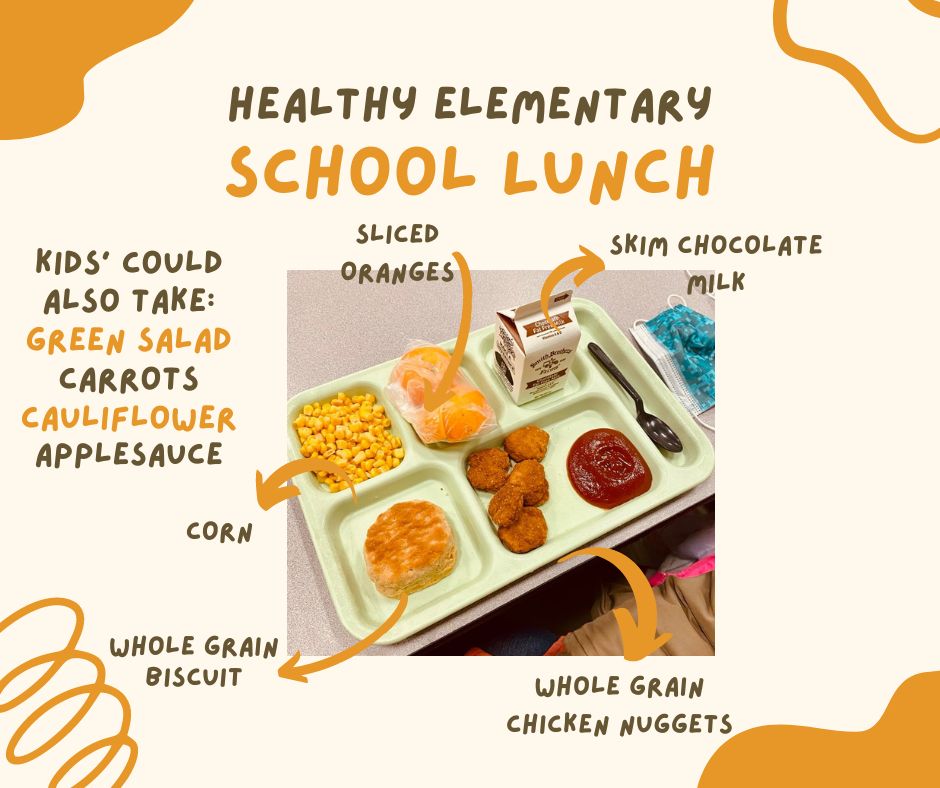- Granite Falls School District 332
- FDA Nutrition Guidelines
Child Nutrition Services
Page Navigation
- Welcome to Food and Nutrition Services
- SUN Bucks (Summer EBT)
- Important Updates
- School Menus
- Free & Reduced Priced Meals
- CEP Schools - Important Information
- Meal Pricing
- Online Payment Instructions
- Prepay for Meals Online
- HB 1660 - Consent to Share Information
- Student Wellness Policy 3700
- Family Resources
- FDA Nutrition Guidelines
- USDA Nondiscrimination Statement
FDA Nutrition Guidelines
-
 Nutrition experts agree - children who don't eat a proper diet run the risk of becoming tired and unmotivated in school, and they're the most likely to become unhealthy or sick. Serving balanced, healthful school meals is an important part of making sure that children are ready to learn. Plus, it has the added benefit of teaching kids healthy eating habits.
Nutrition experts agree - children who don't eat a proper diet run the risk of becoming tired and unmotivated in school, and they're the most likely to become unhealthy or sick. Serving balanced, healthful school meals is an important part of making sure that children are ready to learn. Plus, it has the added benefit of teaching kids healthy eating habits.Drastic changes were enforced in 2010 with the Michelle Obama-backed Healthy, Hunger-Free Kids Act . This act required the USDA to set guidelines for what needed to be included in school nutrition and wellness policies, including informing parents about the policy, goals for physical activity and nutrition education, periodically sharing updates, and assessing progress.
In early 2015, Congress officially relaxed school nutrition standards to give districts additional time to meet new criteria, specifically for the reduction of sodium in school meals. Schools also received increased flexibility on the whole grain mandates. These adjustments should help schools gain back some of the 1.5 million* lost student lunch customers since the new requirements were implemented.
For more information on nutrition standards for schools, check out the USDA's Food and Nutrition Services site. Their site for Child Nutrition Programs is also an outstanding resource for schools.
USDA Non-Discrimination Statement for Child Nutrition Programs
In accordance with federal civil rights law and U.S. Department of Agriculture (USDA) civil rights regulations and policies, this institution is prohibited from discriminating on the basis of race, color, national origin, sex (including gender identity and sexual orientation), disability, age, or reprisal or retaliation for prior civil rights activity.
Program information may be made available in languages other than English. Persons with disabilities who require alternative means of communication to obtain program information (e.g., Braille, large print, audiotape, American Sign Language), should contact the responsible state or local agency that administers the program or USDA’s TARGET Center at 202-720-2600 (voice and TTY) or contact USDA through the Federal Relay Service at 800-877-8339.
To file a program discrimination complaint, a Complainant should complete Form AD-3027, USDA Program Discrimination Complaint Form(link is external), from any USDA office, by calling 866-632-9992 or by writing a letter addressed to USDA. The letter must contain the complainant’s name, address, telephone number, and a written description of the alleged discriminatory action in sufficient detail to inform the Assistant Secretary for Civil Rights (ASCR) about the nature and date of an alleged civil rights violation. The completed AD-3027 form or letter must be submitted to USDA by:
- Mail:
U.S. Department of Agriculture
Office of the Assistant Secretary for Civil Rights
1400 Independence Avenue, SW
Washington, D.C. 20250-9410; or - Fax:833-256-1665 or 202-690-7442; or
- Email: USDA Program Intake(link is external)
This institution is an equal opportunity provider.
- Mail:

